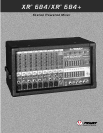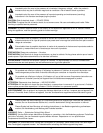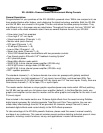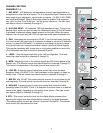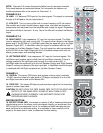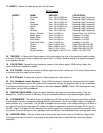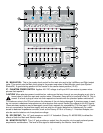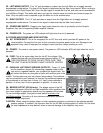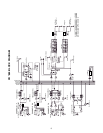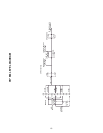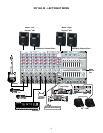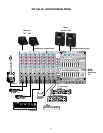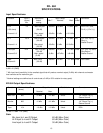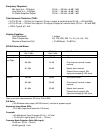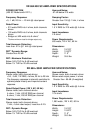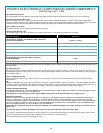
CHANNEL SECTION:
CHANNELS 1-4
1. MIC INPUT: XLR balanced, low-impedance channel input optimized for a
microphone or other low-level source. Pin 2 is the positive input. Because of the
wide range of gain adjustment, signal levels as high as +10 dBV (2.45 V RMS)
can be accommodated. When the phantom power is enabled, this connector
has +48 V on pins 2 and 3 with pin 1 as the ground reference. (The Mic Input
can also be found on channels 5 through 8.)
2. HI-Z/LINE INPUT: 1/4" balanced TRS high-impedance input. The tip is the
positive input, which can also be used for unbalanced inputs. A Pad (#3) switch
is provided to attenuate strong signals present at this input. Within the same
channel, the mic input and the Hi-Z/Line input cannot be used simultaneously.
3. PAD: Attenuates the input signal by 25 dB. If you find that barely touching
the Level control (#4) gives you an enormous increase in volume or if distortion
occurs, try using the Pad switch. In addition to increasing the dynamic range,
the channel input can now accommodate a higher input level before clipping.
This may be necessary with a close mic on loud guitar amplifiers or drum kits.
(The Pad switch can also be found on channels 5 and 6).
4. LEVEL: Sets the signal level sent to the Left and Right bus. (The level
control can also be found on channels 5 through 9.)
5. MON: Adjusts the level of the channel signal (pre-EQ) that is added to the
Monitor mix. (The Monitor control can also be found on channels 5 through 9.)
This control is independent of the main channel level control (#4).
6. LOW EQ: A shelving type of active tone control that varies the bass
frequency levels ±15 dB at 70 Hz. It will add depth to thin signals, or clean up
muddy ones. (The low control can also be found on channels 5 through 9.)
7. MID EQ: Mid ±15 dB. This control sets the amount of cut and boost at the
mid-frequency. (The mid control can also be found on channels 5 through 8.)
8. HIGH EQ: A shelving type of active tone control that varies the treble
frequency levels ±15 dB at 12 kHz. It is designed to remove noise or to add bril-
liance to the signal, depending on the quality of the source. (The high control
can also be found on channels 5 through 9.)
9. EFX: This control varies the level into the digital effects processor bus
adjusting the signal level from the particular channel to the digital processor.
(The effects control can also be found on channels 5 through 8.) The channel
level control (#4) also affects this level.
1
4
5
6
7
8
9
2
3
4



